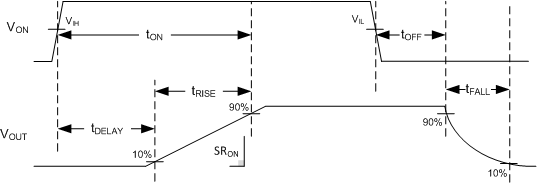JAJSIG1 January 2020 TPS22919-Q1
ADVANCE INFORMATION for pre-production products; subject to change without notice.
8.1 Test Circuit and Timing Waveforms Diagrams

1. Rise and fall times of the control signal are 100 ns
2. Turn-off times and fall times are dependent on the time constant at the load. For the TPS22919-Q1 devices, the internal pull-down resistance QOD is enabled when the switch is disabled. The time constant is (RQOD + RPD,QOD || RL) × CL.
Figure 26. Test Circuit  Figure 27. Timing Waveforms
Figure 27. Timing Waveforms